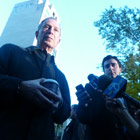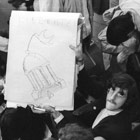
An Electoral Vision for Black Lives
If the Democratic Party really wants to engage black voters, it should take its cues from the organizers already on the ground.


If the Democratic Party really wants to engage black voters, it should take its cues from the organizers already on the ground.

Some Trick: Thirteen Stories by Helen DeWitt New Directions, 2018, 224 pp. Some Trick is Helen DeWitt’s third book. That is to say, her third published book. She has written dozens of others that haven’t made it from her …

To access Dissent’s complete Spring issue, please click here.

Equal parts muckraking journalism and biting satire, the print-only, century-old French newspaper Le Canard enchaîné represents one of the most remarkable stories in modern journalism.

For all his differences with his predecessor, New York City mayor Bill de Blasio has inherited the same fundamental dilemmas that faced Michael Bloomberg—and much of the billionaire’s approach to resolving them.

Capitalism, from its very beginning, was twinned with racism. Two books describe how these two forces emerged together, at the same moment in the unfolding of Western political economy.

By providing a single tier of coverage to all, with automatic enrollment, comprehensive benefits, and no cost-sharing, single-payer provides a distinct, egalitarian vision of universality.

Imagining a low-carbon world means revisiting our conception of freedom itself.

Progressive critics of secularism argue that the Protestant origins of religious liberty make it corrupt beyond saving. But to achieve real pluralism, should the left abandon the concept altogether?

Doomsday prepping has long been associated with the right. Why is it catching on among liberals?

Profiteering is distorting the response to the opioid epidemic as much as it shaped its origin.

The genius of Donald Glover’s Atlanta is to show the surreality of black life in America.

As the old neighborhood gentrifies, its transatlantic spirit lives on as the influence of black culture grows—from Lagos to London, from Havana to Atlanta.

What can account for the worldwide impulse to rebel? Fifty years after 1968, a personal reflection on the Columbia University uprising.

In his survey of the writing of dictators, Daniel Kalder is so dismissive of the tyrants’ actual ideas that it becomes difficult to understand why they had any power in the first place.